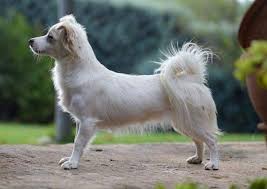
Kokoni
Conditions of detention
Kokoni dogs are highly adaptable and can thrive in various living conditions, including apartments and houses. They do well in homes where they are part of the family and receive plenty of attention.
Useful Fact: Kokonis are excellent for urban living due to their small size and moderate exercise needs, making them ideal companions for city dwellers.
Nutrition and diet
A balanced diet rich in high-quality protein, fats, and essential nutrients is crucial for a Kokoni’s health. Both high-quality commercial dog food and well-prepared homemade diets can meet their nutritional needs.
Useful Fact: Monitoring their diet and portion sizes is important to prevent obesity, a common issue in small breeds.
Health
Kokoni dogs are generally healthy with a lifespan of 12-15 years. They can be prone to certain genetic conditions such as patellar luxation and dental issues.
Useful Fact: Regular veterinary check-ups and maintaining a healthy diet and exercise routine can help prevent common health issues in Kokoni dogs.
Grooming and care
Kokoni dogs have a medium-length, dense coat that requires regular grooming. Their coat can come in various colors, including white, black, brown, and combinations. Regular brushing helps to keep their coat clean and free of mats.
Useful Fact: Due to their dense coat, Kokonis may need more frequent grooming during shedding seasons to manage loose hair.
Education and training
Kokoni dogs are intelligent and eager to please, making them relatively easy to train. Positive reinforcement methods work best, as these dogs respond well to rewards and praise.
Useful Fact: Early socialization and obedience training are crucial for Kokoni dogs to develop into well-mannered adults, helping them balance their playful nature with good behavior.
Toys and entertainment
Kokoni dogs enjoy toys that challenge their minds and provide physical exercise. They particularly love interactive toys, puzzle games, and activities that involve play and companionship.
Useful Fact: Providing a variety of toys and engaging in regular play sessions can help keep a Kokoni mentally and physically stimulated.
Safety
Ensure your Kokoni has a secure environment, especially during outdoor activities, to prevent them from wandering or getting into danger.
Useful Fact: Kokonis are naturally curious and may explore if given the chance, so supervision and secure fencing are important to keep them safe.
Accessories
A sturdy leash, comfortable harness, and ID tags are essential for your Kokoni’s safety during walks and outings.
Useful Fact: Kokonis benefit from wearing a harness rather than a collar, as it helps distribute pressure evenly and prevents neck strain during walks.
Socialization
Early and continuous socialization is crucial for Kokoni dogs to ensure they are comfortable around people, other dogs, and different environments.
Useful Fact: Positive socialization experiences from a young age can help Kokoni dogs develop into well-adjusted adults, reducing the likelihood of fear or aggression.
Travel and Transportation
Kokoni dogs can travel well if accustomed to it from a young age. Ensure they have a comfortable crate or seatbelt harness for car rides.
Useful Fact: Regular short trips can help your Kokoni become more comfortable with travel and reduce anxiety during longer journeys.
Behavior and psychology
Kokoni dogs are known for their loyalty, intelligence, and playful nature. Understanding their behavior and providing appropriate outlets for their energy is important.
Useful Fact: Mental stimulation through training and interactive play is as important as physical exercise for a Kokoni’s well-being.
Legal aspects
Owning a Kokoni may come with specific legal requirements depending on your location, such as licensing, microchipping, and adherence to leash laws.
Useful Fact: Research local regulations and ensure you comply with any breed-specific legislation or requirements.


